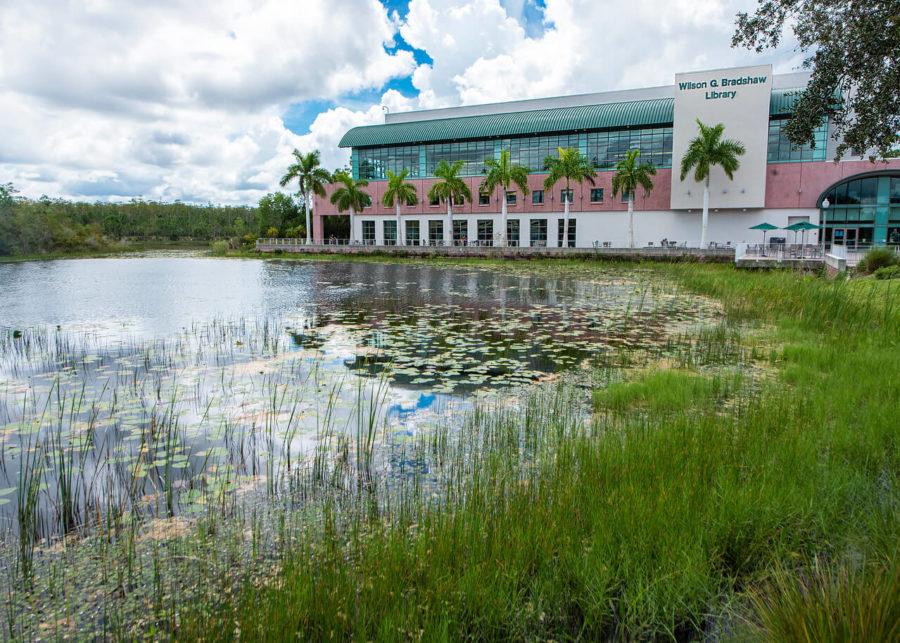Going Green
December 24, 2021
During the school year, college students live very repetitive lives. “Eat, sleep, study, repeat” is the mantra that replays in their heads from the moment they wake up. Their lives are filled with commutes to campus, quick bites to eat and late-night visits to the library.
For most students, sustainable living is not a major consideration. Students don’t understand that making minor changes to their lifestyle won’t hurt their wallets but will increase their knowledge of their impact on the environment.
“It is beneficial for all of us to take steps in reducing our carbon footprint because of the impact we have on our planet and the detrimental effects it has to our current lives and the lives of future generations,” Assistant Professor of Environmental Education Molly Nation said. “It is important for college students to make changes in their daily lives to be able to live a way that won’t tax our environment so greatly.”
Sustainability Coordinator Kathleen Crawford said that college students are more likely to change their habits for the better. Good habits like picking up litter when you see it, eating a more plant-based diet, conserving energy by turning off lights, and driving less or carpooling when possible, all help to better the environment.
“The behaviors that we exhibit, just because of what is normal in 2021, have a far greater impact on the environment than our grandparents,” Nation said. “We live in a very global society where consuming is a very large part of our lives, and we probably don’t even realize the impact that it has.”
There are many alternative ways of shopping that can reduce your carbon footprint and therefore make you a more sustainable consumer. These changes will not only save students money but they are a step in the right direction to becoming more sustainable.
“Reusing is one of the biggest things college students can do to reduce the waste that they are pumping into landfills,” FGCU environmental education professor Heather Skaza-Acosta said. “When you buy secondhand, you also reduce the amount of fossil fuels it takes to create new products.”
Another step towards a more sustainable lifestyle for college students is eating a more plant-based diet. The number of resources that are used for meat production is very high. Skaza-Acosta explained that there is so much land, fossil fuels, energy, fertilizers, pesticides, etc., that go into the production of meat that can be cut down by reducing your consumption.
“It is really easy for me as a vegetarian to say one of the easiest and quickest things you can do is start pulling meat out of your diet,” Skaza-Acosta said. “I don’t want to say quit eating meat because that is unrealistic to ask everyone, but college students can lean towards a more plant-based diet.”
Even if college students cut out meat once a week or from one meal a day, it could become a positive habit that benefits the environment. The smallest changes from one individual can impact the environment in the most significant way.
“We’ve been told since elementary school to turn off the lights, don’t litter, etc., and we are cognizant of this knowledge,” Crawford said. But for many college students, this is the extent of their awareness of sustainability.
Crawford said that the students who come to FGCU embrace the university’s sustainability missions, but FGCU also has a mission to change the priorities of those who aren’t as educated on personal sustainability and collective action.
Knowledge is a major part of becoming a more environmentally sustainable college student.
“If we learn everything we can [about sustainability] right now, we can progressively get better and implement it into our future habits,” Junior Macy Moody said. “If I knew more about sustainability and how we affect the environment with our actions I feel like more would be down on our end.”
While Moody has made some efforts to live more sustainability, like joining organized road cleanups and reusing glass jars, she hopes to learn more.
“Later on in many years, if someone showed me an image of what our environment would look like and how I could prevent it from looking worse, I would change aspects of my life to fix it,” Moody said.
Talking about sustainability can be intimidating and there will always be a voice in the back of your head asking if it is already too late to make an impact, but college students need to have the drive to make a difference and act on their knowledge. A different mentality towards change in the environment will alter how students act in their day-to-day life.
“Having a positive outlook and being able to realize that these steps toward sustainability are possible will make a difference in the environment,” Nation said. When a group of students are hopeful about their impact on the environment initiatives like litter cleanups and tree plantings will be more common.
Skaza-Acosta shared a story about a mentor in her field of study who wakes up every day with a ‘Today I will make a difference’ mentality. If college students think that they will make a difference tomorrow and that today doesn’t have significance, change will not happen.
College students have the power to positively impact the world by using their voices as a tool and acting in a way where sustainability comes first. Students can easily convince their peers to be more sustainable when there is a passion for the environment in their heart.
“I feel hopeful for the next generation, and I know that these environmental issues can be solved because these students are resilient, innovative, and all of these wonderful things,” Nation said. “If we work together with a common goal [of sustainability], we can foresee a future where all of us can live healthily and safely in the environment around us.”





























